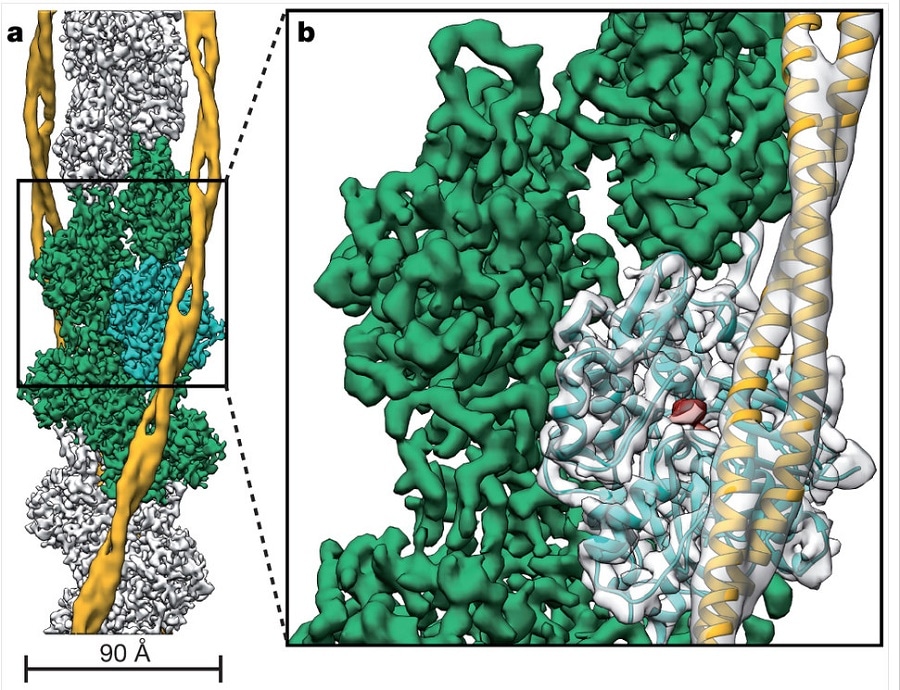Jul 25 2016
A team of researchers from Penn State University hope to obtain an advanced microscope that will enable them to "go deep", to promote the discoveries in materials science and biomedical research.
 Cryo-electron microscopes enable the creation of detailed atomic and molecular models such as this one, a full cryo-EM reconstruction of F-actin and a corresponding close-up view with the atomic and molecular model of an F-actin subunit (cyan) and tropomyosin (yellow). Image: Courtesy of Julian von der Ecken and Prof. Dr. Stefan Raunser, Max Planck Institute of Molecular Physiology, Dortmund, Germany
Cryo-electron microscopes enable the creation of detailed atomic and molecular models such as this one, a full cryo-EM reconstruction of F-actin and a corresponding close-up view with the atomic and molecular model of an F-actin subunit (cyan) and tropomyosin (yellow). Image: Courtesy of Julian von der Ecken and Prof. Dr. Stefan Raunser, Max Planck Institute of Molecular Physiology, Dortmund, Germany
Penn State Board of Trustees recently approved the purchase of a cryo-electron microscope, which is capable of freezing samples at cryogenic temperatures. This temperature typically begins at or below -238°F, and can cut down on radioactive interference and enhance resolution to the atomic level.
According to Jim Marden, professor of biology and director of operations, Huck Institutes of the Life Sciences, the cryo-electron microscope will enable the team to make observations down to 3 Å, approximately the resolution of a single carbon atom.
Marden also stated that the device is likely to be instantly applied in research conducted by Penn State researchers on viruses, enzymes, and the structure of the nucleosome.
By understanding these structures new disease treatments and other discoveries can be found, as vaccine and drug design requires knowledge regarding how molecules work together at the scale of individual atoms.
Now we have a novel freezing technique, image sensor and algorithms that allow us to see these detailed structures and thus understand function. We are on the edge of revealing how life works and we know that this involves imaging -- and being able to see detail.
Jim Marden, Professor of Biology, Penn State University
The cryo-electron microscope is a specialized research equipment worth $8.6 million. Marden supposes the Materials Characterization Lab in the Institute for Materials Research will also gain from the cryo-electron microscope.
"The materials scientists will use this scope to better understand soft materials and this new microscope will allow new types of collaborations at the interface of the fields of materials science and life sciences," said Marden. "For example, targeted delivery of drugs using nanoparticles will benefit greatly from visualizing the engineered particles and how they interact with cell surfaces.
According to Peter Hudson, the Willaman Professor of Biology and director of the Huck Institutes of Life Sciences, the microscope will also be as an important tool in reaffirming the role of Penn State as a leader in the progress of the convergence of the materials science and life sciences.
We are at a most exciting time in the life sciences -- the technological developments with the Cryo EM will allow us to interpret function from structure and in so doing revolutionize biomedical, food, disease and materials research. Universities are at an auspicious junction and the leading universities like Penn State need to invest in this technology to be able to be in the leading pack of researchers and entrepreneurs.
Peter Hudson, Professor of Biology, Penn State University